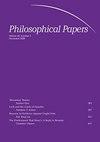领土损失是对世界治理的挑战
IF 1.3
3区 哲学
0 PHILOSOPHY
引用次数: 3
摘要
各国政府在缓解人为气候变化方面失败得惊人,可持续的缓解方法仍然遥不可及。仅这一情况就说明需要进行体制改革。然而,气候变化正在并将继续造成大规模的损失和破坏。也许最引人注目的损失是领土。气候变化引起的海平面上升不仅威胁着广大的沿海地区,也威胁着整个国家。因此,缓解已不再足够。从减缓气候变化的集体失败中产生了集体的补偿责任。对领土损失的补偿使制度缺陷成为人们关注的焦点——这也是我在这里探讨这些缺陷的原因。具体来说,我认为(1)对领土损失提供赔偿在道义上是必要的,在政治上也是有利的;(2)如果不建立一个负责协调这一进程的全球机构,就不能有效地或高效率地执行这一赔偿。此外,我(iii)为创建全球补偿性气候基金提出设计建议,(iv)将我的建议置于关于理想理论和非理想理论的辩论中,(v)主张提议的机构将成为世界治理的工具,而不是世界政府的一种形式。本文章由计算机程序翻译,如有差异,请以英文原文为准。
Territorial Loss as a Challenge for World Governance
Abstract National governments have failed spectacularly to mitigate anthropogenic climate change and a sustainable approach to mitigation remains out of sight. This circumstance alone demonstrates the need for institutional reform. However, climate change is causing and will continue to cause large-scale loss and damage. Perhaps the most striking kind of that loss is territorial. Climate change induced sea level rise threatens not only vast coastal areas but also entire states. Therefore, mitigation is no longer sufficient. From the collective failure to mitigate climate change arises the collective duty to compensate. Compensating for territorial loss puts the spotlight on institutional deficiencies—which is why I explore them here. Specifically, I argue that (i) providing compensation for territorial loss is both morally required and politically advantageous and that (ii) it cannot be implemented effectively or efficiently without creating a global institution in charge of coordinating the process. Further, I (iii) make design recommendations for creating a global compensatory climate fund, (iv) situate my proposal within the debate on ideal and non-ideal theory, and (v) contend that the proposed institution would be a tool of world governance rather than a form of world government.
求助全文
通过发布文献求助,成功后即可免费获取论文全文。
去求助
来源期刊

Philosophical Papers
PHILOSOPHY-
CiteScore
2.10
自引率
0.00%
发文量
18
期刊介绍:
Philosophical Papers is an international, generalist journal of philosophy edited in South Africa Original Articles: Articles appearing in regular issues are original, high-quality, and stand-alone, and are written for the general professional philosopher. Submissions are welcome in any area of philosophy and undergo a process of peer review based on initial editor screening and refereeing by (usually) two referees. Special Issues: Topic-based special issues are comprised of both invited and submitted papers selected by guest editors. Recent special issues have included ''Philosophy''s Therapeutic Potential'' (2014, editor Dylan Futter); ''Aging and the Elderly'' (2012, editors Tom Martin and Samantha Vice); ''The Problem of the Criterion'' (2011, editor Mark Nelson); ''Retributive Emotions'' (2010, editor Lucy Allais); ‘Rape and its Meaning/s’ (2009, editor Louise du Toit). Calls for papers for upcoming special issues can be found here. Ideas for future special issues are welcome.
 求助内容:
求助内容: 应助结果提醒方式:
应助结果提醒方式:


